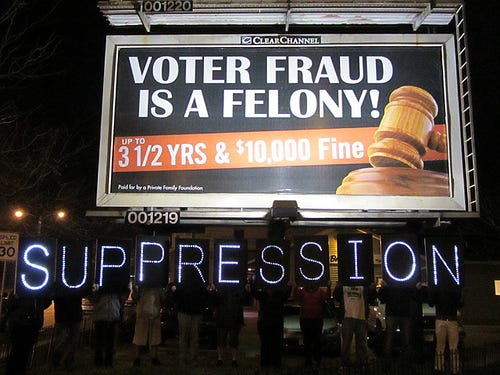Voter suppression scheme would require voters to re-register in person or be removed from checklist

The latest voter suppression scheme by Republicans involves a little-known provision of state election law that could be invoked to require voters in four Dover voting wards to re-register in person before the next election.
Foster’s reports David Scott, a former Dover councilman and Republican state representative, has filed a formal petition with the secretary of state’s office requesting a “revision and verification” of the voter checklist in Dover Wards 1, 2, 3 and 4. If the state ballot law commission approves the request, voters who fail to re-register in person will be stricken from the checklist.
By law, the state’s voter checklists are purged every ten years. Registered voters who have not voted during the previous four years and do not respond to a notification from the board of supervisors are removed from the checklist.
A separate provision allows voters to request an additional revision and verification of the voter checklist. If 50 registered voters (or five percent of the registered voters) request the purge, the state ballot law commission investigates and determines whether to approve the request. Assistant Secretary of State Karen Ladd told Foster’s this provision has not been used in at least 40 years.
Scott has been pursuing allegations of voter fraud since he lost his House re-election bid in 2004. In a 2012 Union Leader op-ed, Scott claimed his seat was stolen by UNH students “who were not Dover residents.”
“Among the stream of voters coming to vote were many young people we did not recognize from our door-to-door campaigning,” Scott wrote. “We also noticed several cars with Maine and Massachusetts license plates that pulled up to our voting location and dropped off three to four students. These young voters entered the polling place, obtained ballots and voted,” he continued. “Those students, most of whom I believe were from UNH, by their voting stole votes from Dover residents.”
After that loss, Scott began sending mail to voters who registered on election day. He catalogs those letters that the post office returns as undeliverable as evidence of voter fraud. In a Foster’s op-ed, Scott said over 70 of the approximately 1000 letters mailed after the 2014 general election were returned.
Scott will have an opportunity to make his case to the ballot law commission Monday in a public hearing. The city of Dover will argue the update is not necessary.
City Attorney Anthony Blenkinsop told Fosters that it is “virtually certain” that many voters would fail to re-register if the checklist is purged. Although unregistered voters could still register on election day, he said, “long lines and other issues could keep some people from voting.”


